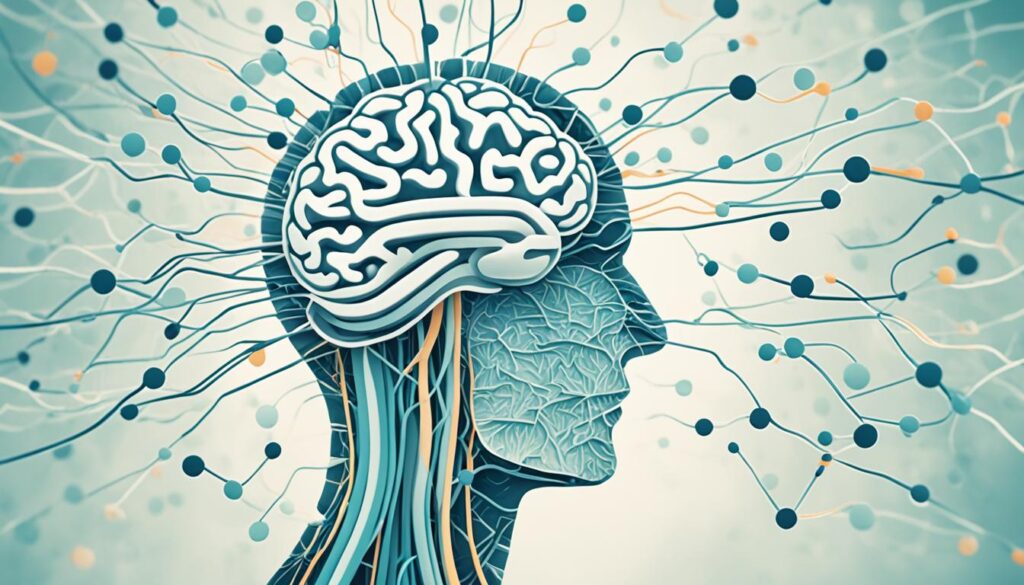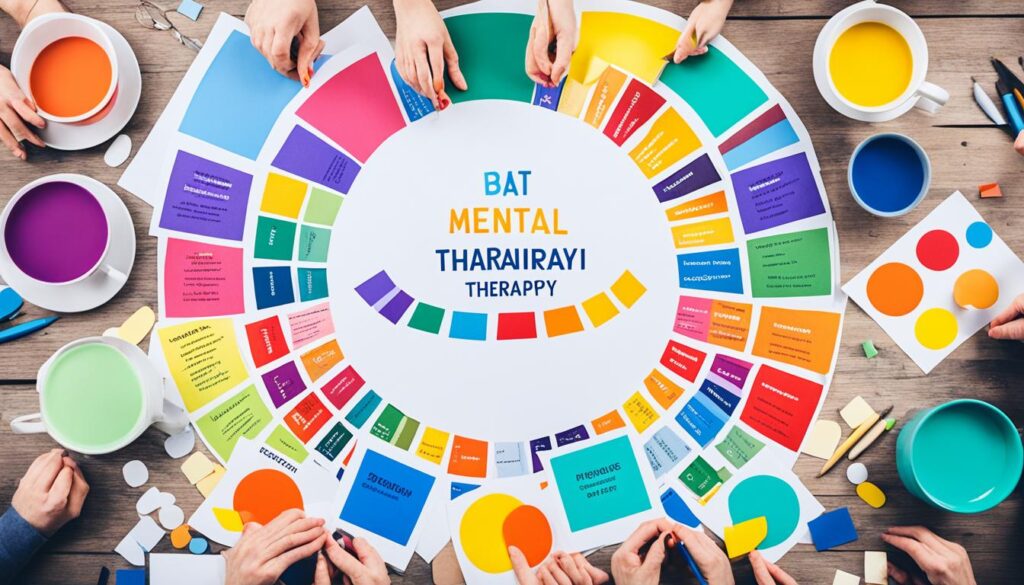Mental health therapy helps people understand their minds better. It lets them work through emotions and build better patterns. This makes their lives closer to what they want. At first, some folks might not like the idea of therapy. They think it’s just talking with someone. But, studies prove that therapy really does help reduce mental health conditions symptoms.
Key Takeaways
- Mental health therapy helps people understand their own thoughts, feelings, and behaviors.
- Therapy provides a supportive environment to address mental health challenges.
- Therapy can be highly effective in treating a variety of mental health conditions.
- Many people initially resist the idea of therapy, but it can lead to significant improvements.
- Therapy can help individuals make positive changes and live a more fulfilling life.
Understanding the Purpose of Mental Health Therapy
Mental health therapy aims to help people deal with life’s challenges. It focuses on creating better habits and changing negative thought patterns. In therapy, a mental health expert guides individuals to spot and manage things causing them stress.
Navigating Life’s Challenges
Therapy assists individuals in handling stress, anxiety, and traumatic events. Therapists create custom strategies utilizing methods like cognitive-behavioral therapy (CBT) and dialectical behavior therapy (DBT). These help people face and manage their problems better.
Building Healthier Habits
One big aim of therapy is to foster healthier living. Therapists help tackle bad habits like substance abuse. They aid in swapping these for activities that promote well-being, like proper coping strategies and self-care routines.
Changing Mindsets for a Better Life
At its core, mental health therapy teaches people to analyze their thoughts. The focus is on breaking harmful thought habits. This process aims to boost mental health and overall life satisfaction. Collaborating with a therapist helps individuals acquire tools to manage and enhance their well-being.
The Science Behind Mental Health Therapy

Neuroscience reveals the strong impact of mental health therapy on our brains. This is known as neuroplasticity. It shows how our brains can adapt and change because of experiences like therapy.
Neuroplasticity and Brain Changes
Engaging in cognitive-behavioral therapy (CBT) can change parts of the brain. The prefrontal cortex (for thinking) and the amygdala (for fear) get more connected. This connection helps us handle emotions better and make smarter choices, reducing stress and building better habits.
Modifying Gene Expression and Brain Structure
Mental health therapy does more than just change the brain’s structure. It also affects gene expression and the brain’s structure. These changes play a part in why therapy is long-lasting for those with mental health conditions.
Strengthening Neural Connections
Behavioral therapy and dealing with thoughts in talk therapy create new coping skills. These changes can be seen in how neural connections in the brain grow stronger. It shows that therapy changes our thinking and behaviors over time, thanks to the brain’s plasticity.
Types of Mental Health Therapy

There are several distinct approaches in mental health therapy. These help individuals with their mental health issues. They also improve behaviors and well-being. The main types include cognitive–behavioral therapy (CBT), psychodynamic therapy, and humanistic therapy, says the first source.
Cognitive-Behavioral Therapy (CBT)
Cognitive–behavioral therapy is practical and goal-oriented. It helps individuals spot and change their negative thoughts and behaviors. These changes aim to improve their mental health and functioning by developing better coping strategies.
Psychodynamic Therapy
Psychodynamic therapy delves deeper into the individual’s past experiences. It looks at unconscious processes and how they affect current thoughts and behaviors. This therapy method values the therapeutic relationship. It helps with self-awareness and personal growth.
Humanistic Therapy
Humanistic therapy highlights each person’s ability for self-direction and happiness. It aims to make individuals feel more authentic, empowered, and fulfilled. Humanistic therapists use techniques like listening and support. They help clients discover themselves and grow personally.
Mental Health Therapy Efficacy and Benefits

Mental health therapy has a proven track record. Studies show it can really help those fighting different mental health conditions. Its biggest plus is how it can make life better by reducing disability and improving functioning in different parts of life.
Reducing Disability and Improving Functioning
Psychotherapy can cut down on sickness and death risks. It also boosts work efficiency and lessens the need for being in a psychiatric hospital. Techniques like cognitive-behavioral therapy (CBT) and dialectical behavior therapy (DBT) treat the root causes. This helps people cope with symptoms and take charge of their lives again.
Preventing Relapses of Mental Health Conditions
Mental health therapy is great at keeping some conditions from coming back, like anxiety or mild-to-moderate depression. Research shows that therapy often results in fewer symptom recurrences than just taking medicine.
Long-Term Benefits of Short-Term Therapy
The benefits of mental health therapy can outlast the therapy itself. Even short-term therapy (12 to 20 sessions) can make a big difference in an individual’s mental health and well-being. By teaching coping strategies and self-care methods, mental health professionals set up lasting positive changes in the person’s life for years to come.
Mental Health Therapy for Specific Conditions

Therapy is a powerful tool in treating mental health issues. It can be customized to target different conditions. It’s shown to work for anxiety, depression, OCD, and trauma-linked disorders.
If someone has anxiety, therapy can teach them skills to handle it. They learn to challenge their negative thoughts and face their fears safely. For depression, therapy helps find out why they feel down. It also encourages positive habits and thoughts.
OCD therapy focuses on resisting compulsions and facing fears. This approach helps lessen the impact of OCD symptoms.
For trauma, therapy creates a healing space. It teaches healthy ways to cope and deals with its effects. Methods like EMDR or TF-CBT can assist in the healing process.
Therapy doesn’t stop there. It works for eating disorders, personality issues, and more. By partnering with a mental health expert, people can tackle their unique problems. They can design a plan to boost their mental health.
Choosing a Mental Health Therapist

The skills and education of a mental health therapist are very important. They greatly affect how well the therapy works.
Therapists with a deep understanding of psychotherapy can help. They have studied for years to earn their degrees.
Qualifications and Training of Therapists
A mental health professional should have a degree in psychology or a related field. They must also be licensed in their state. This means they meet high educational and professional standards.
Finding the Right Therapist for Your Needs
It’s key to look for a therapist that knows about your specific issue. Feeling at ease and open with your therapist is vital for successful therapy.
Asking the Right Questions
It’s crucial to ask certain questions before choosing a therapist. Ask about their experience, how they work, and their fees. This helps make sure you’re both a good fit and can get the most out of therapy.
The Therapeutic Process

Psychotherapy is a joint effort between an individual and a mental health therapist. Its aim is to sort through challenges causing mental health issues. The core of this work is the therapeutic relationship. It’s vital, relying on trust, being open, and showing respect.
Building a Therapeutic Relationship
A powerful mental health therapy journey happens when someone and their therapist form a solid, trusting connection. It involves sharing all thoughts, feelings, and worries honestly. With the bond growing, the mental health professional gets to know the person’s needs better. They can then shape the psychotherapy to fit them.
Setting Goals and Tracking Progress
The person in therapy and their therapist pinpoint specific, easy-to-measure objectives for the mental health treatment. These goals create a roadmap for the work ahead. They also help both to see the progress made over time. Reviewing and tweaking these goals keeps the therapy on point and helpful.
Homework and Skill-Building
Part of therapy involves the therapist assigning homework and engaging in skills practice. These help turn ideas discussed in sessions into everyday actions. Taking an active role in learning these skills is important for real, lasting changes.
Mental Health Therapy and Other Treatments

Mental health therapy works well on its own. Yet, sometimes it’s mixed with other treatments. For example, a psychiatrist might also recommend some medicine. Research shows that using therapy and medicine together can lower the chances of the mental health issues coming back.
Therapy and Medication
If you’re fighting a tough mental health , doctors might suggest a mix of and prescribed medication. This method is designed to not just help with the symptoms but also teach you how to manage your mental health for the long haul.
Alternative and Complementary Therapies
Some folks like to look beyond standard and meds. They might try alternative therapies or complementary therapies. These can be things like meditation, yoga, or even herbal remedies. While the science behind these varies, they can be great additions to traditional treatments, offering a full-picture mental health care.
| Treatment Approach | Description | Potential Benefits |
|---|---|---|
| Therapy and Medication | Combining with prescription medications prescribed by a psychiatrist | Reduces relapse risk, provides more holistic mental health care |
| Alternative Therapies | Includes meditation, yoga, acupuncture, and herbal remedies used with | Offers a holistic viewpoint, may enhance traditional treatments, helps manage stress and anxiety |
Mental Health Therapy Considerations

When looking into mental health therapy, think about the practical side too. Many people worry about how much it will cost and if their insurance will help. They want to know if their insurance coverage will pay for it.
Cost and Insurance Coverage
The price of therapy changes a lot. It depends on the therapist’s experience, where they are, and what kind of help you need. Many therapists adjust their fees based on what you earn or how much you’re able to pay. Always ask about the cost and if they take insurance.
Finding Low-Cost or Sliding-Scale Options
If you don’t have a lot of money, don’t worry. There are low-cost and sliding-scale options. Health centers, community clinics, and places connected to universities offer therapy at lower prices or let you pay what you can. Some therapists give discounts for a certain number of sessions too.
Also Read: Mind Matters: A Comprehensive Guide To Mental Health Diseases
Conclusion
Mental health therapy involves working together to overcome life’s hurdles and improve our lives. It’s supported by research showing how it changes our brains for the better. There are many therapeutic approaches and skilled professionals ready to help.
Maybe you’re facing a specific issue or want to feel better overall. Mental health therapy is here for you. Working with a therapist or psychotherapist can give you the tools to succeed. There are many centers and affordable services to choose from. So, help is within reach.
Starting your journey to better mental health might not be easy. But, with support, you can make it. Don’t be afraid to seek help. Your well-being is one of the best investments you can make.
FAQs
Q: How does mental health therapy work?
A: Mental health therapy, also known as psychotherapy, involves meeting with a trained therapist to address mental health concerns. The therapist may use different types of therapy, such as cognitive behavioral therapy (CBT), dialectical behavioral therapy (DBT), or interpersonal therapy, to help you understand and address your specific mental health issues.
Q: What is the role of a therapist in mental health therapy?
A: A therapist plays a crucial role in mental health therapy by creating a safe and confidential space for you to explore your thoughts and feelings. They can help you identify sources of stress, consider new ways of thinking, and develop a treatment plan that works well for you.
Q: How do I find a therapist?
A: To find a therapist, you can start by asking for recommendations from your primary care provider, researching online, or contacting your insurance company for a list of covered providers. It’s important to find a therapist with whom you feel comfortable and who is experienced in treating your specific disorder.
Q: What are the different types of therapy available?
A: There are various types of therapy available, including cognitive behavioral therapy, dialectical behavioral therapy, interpersonal therapy, and group therapy. Each type of therapy focuses on different aspects of mental health and may be more suitable depending on your needs.
Q: How confidential is mental health therapy?
A: Mental health therapy is typically confidential, and therapists are bound by laws and ethical standards to keep your information private. However, there are exceptions to confidentiality, such as if there is an immediate risk of harm to yourself or others.
Q: What can I expect in therapy sessions?
A: In therapy sessions, you can expect to talk to your therapist about your thoughts, emotions, and behaviors. Together, you will work on identifying and changing troubling patterns, exploring treatment options, and developing coping strategies to help you deal with your mental health concerns.
Q: How does therapy help with specific mental health disorders?
A: Therapy can help with specific mental health disorders by providing a structured approach to understanding and managing symptoms. Through therapy, you can learn to identify triggers, develop healthy coping mechanisms, and make positive changes in your life to improve your mental well-being.
Source Links
- https://mhanational.org/science-behind-therapy
- https://www.apa.org/topics/psychotherapy/understanding
- https://www.nimh.nih.gov/health/topics/psychotherapies




